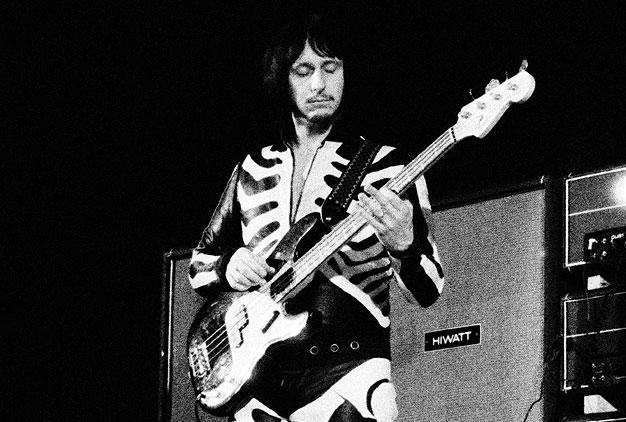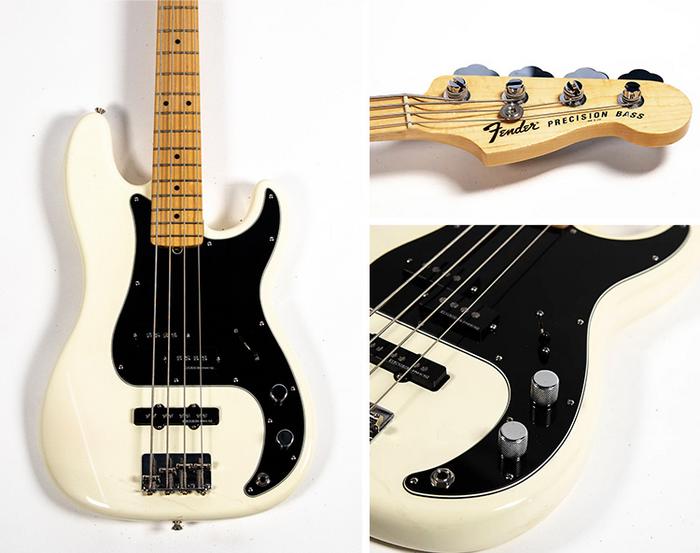There was a moment, steeped in the whirl of debates echoing through every corner of the Guitar Player magazine office, when I realized: The question of the best bassist of all time isn’t just a matter of public opinion; it’s a reflection of the soul-stirring essence that defines truly captivating music. As someone deeply entrenched in the music world, I’ve witnessed firsthand the passionate arguments surrounding this topic. Names like Jaco Pastorius and James Jamerson often emerged as favorites, but the sheer diversity of opinions suggests something profound and universal about the bass guitar’s role in shaping music. This article delves into the intricate layers of rankings, expert opinions, and insider insights on who the top bass players are and why they matter so much. In exploring these dimensions, we not only uncover the greatest bassists but also venture into what elevates a musician to legendary status. Join me as we dive into this harmonious exploration.
Who Are the Best Bassists?
The Iconic Legends

In my editorial journey, I’ve often encountered legendary bassists whose bass lines are not just notes on a scale but the very foundation of timeless classics. Did you know that some of the most influential bass lines have shaped entire genres of music? These top bass players embody the spirit of innovation and virtuosity, setting standards that others strive to reach. When we delve into ‘Who Are the Best Bassists?’, it’s essential to acknowledge those iconic legends who have left an indelible mark on the music world.
Paul McCartney, for instance, took the role of the bassist in The Beatles beyond its traditional boundaries, crafting lines that balanced melody and rhythm in a way that revolutionized pop music. Then there’s James Jamerson, whose work with Motown laid the soulful underpinnings of countless hits. Each of these artists defined what it means to be iconic in their own right, weaving complexity and emotion seamlessly into their music and setting a foundation for modern influences and innovations in the bass playing world.
Modern Influences

In today’s ever-evolving musical landscape, contemporary bassists are on the cutting edge, redefining what’s possible with the bass guitar through modern bass guitar techniques and unparalleled creativity. Having explored emerging trends in guitar and bass over the years, I find it nothing short of exhilarating to witness how these musicians leverage music technology to push the boundaries of sound. The question I often ponder is, how are contemporary bassists redefining musical landscapes with innovative techniques? This curiosity leads me to closely examine how these artists blend technology with tradition, elevating the instrument’s role in modern compositions.
From the groundbreaking slap techniques of Flea to the intricate fingerstyle of Thundercat, there’s an ongoing dialogue in bass playing that resonates across genres. These innovators are not just playing music; they’re reshaping it, making their mark in the lineage of the world’s best bassists. Their contribution is a testament to the evolution of bass, underscoring their pivotal role in the future of music.
What Makes a Great Bassist?

Having analyzed the work of countless bassists, I’ve come to appreciate the intricate balance between technical prowess and expressive artistry that defines greatness in bass playing. While many musicians aim for precision, a truly great bassist embodies a blend of technical skill, creativity, and emotional connection that elevates the music to an entirely new level. So, what makes a bassist great? Is it technical skill, creativity, or emotional connection that makes a bassist truly great? After years of exploring the depths of this question, I’ve found that the answer lies not in any single attribute but in the seamless integration of all three.
Technical skill provides the backbone; nimble fingers can transform complex rhythms into fluid bass lines that anchor even the most intricate compositions. Yet, without creativity, that skill remains just an exercise. It’s the innovative use of those capabilities that allows bassists to craft grooves that resonate on a deeper level. However, even the most creative line would fall flat without an emotional connection—this is the soul of great bass playing. It’s the magic that makes the listener feel each note, pulsating like a heartbeat through the song. Thus, in my experience, the best bassists are those who not only master their instruments but imbue their music with a signature that speaks to the spirit, crafting a dialogue between the artist and the audience.
When Did Bassists Rise to Prominence?

In my explorations of music history, I’ve noted several turning points where bassists transformed their roles, demanding recognition alongside other instrumentalists. Indeed, the evolution from the rhythm section’s shadow to the spotlight has been a fascinating journey. What pivotal moments in music history catapulted the role of the bassist from the background to center stage? It’s an intriguing inquiry that beckons us into the past, where the bass guitar gradually broke free from the confines of its traditional backing role.
One such moment was in the 1960s with the British Invasion. Bands like The Beatles and The Rolling Stones showcased the bassist’s ability to weave complex melodic lines rather than merely provide a rhythmic foundation. As I poured over Andre Lewis’s work with Santana or immersed myself in the sounds of Jaco Pastorius, I witnessed bassists beginning to redefine music genres. Their innovation transcended the mere technical playing; they became influential voices that shaped the direction of music itself.
Where to Hear the Best Bass Playing?

From rock to funk, I’ve delved into various musical genres and discovered each one unveils its own unique showcase of bass excellence. But what genres hold the most profound examples of masterful bass playing, and why do they resonate so deeply? Boldly speaking from experience, jazz, rock, and funk have stood out in my journey. These genres create an intricate tapestry where the bass isn’t just an underpinning but a driving force that resonates through every note.
In the smoky jazz clubs of New York, the upright bass sings with a soulful depth that’s unparalleled, offering a rhythmic heartbeat that wraps you in its embrace. My exploration into rock festivals, on the other hand, exposes the bass as a powerhouse of energy, setting the intense pulse that drives every crowd wild. Meanwhile, funk’s bass lines captivate with their infectious grooves, a syncopated dance that I find irresistibly compelling, proving time and again why they hold such a profound influence over musicians and listeners alike.
Why Are Bassists Important in Music?

Through my years in journalism, I’ve learned that the bassist is the unsung hero of the band, often overlooked but essential for creating the rhythm and harmony that drives a song. Can a band truly thrive without a skilled bassist, or is the role often underestimated? This question gets to the core of what makes a bassist invaluable in music. A bassist’s ability to bridge the rhythm and melody lays the foundation for a cohesive sound. Without this crucial element, a band’s music can feel disjointed and incomplete.
Personally, I’ve seen how the groove of a bass line can transform an ordinary track into something magical. Bassists like James Jamerson or Geezer Butler didn’t just support the music; they enriched it, bringing depth and resonance that elevates the entire performance. In essence, the bassist is the linchpin that holds the musical structure together, subtly yet powerfully influencing every note, every beat. Their contribution may often go unnoticed, but it is undeniably integral to the soul of the music.
Polls and Public Opinions on the Best Bassists

Delving into polls and public opinions on bassists has always been a passion of mine. It’s a pursuit that not only pinpoints which artists are lauded but sheds light on the pulse of the music community itself. As someone who’s been immersed in the world of music for decades, I find that these polls act as a mirror reflecting our shared attitudes and re-evaluations of artistic ingenuity and virtuosity. What does public opinion reveal about our collective understanding of greatness in bass playing? This question fuels my fascination, urging me to dig deeper into the nuanced perceptions that shape our appreciation of these musicians.
Through numerous polls conducted over the years, a pattern often emerges. The giants like Jaco Pastorius and Paul McCartney frequently top the lists; their innovations and unforgettable influence cement them as perennial favorites. Yet, as I engage with these data points and conversations, I’m struck by how fresh voices and diverse stylistic innovators increasingly ripple through the ranks. Genre-blending maestros and technically adventurous bassists continually reshape the contours of what audiences deem ‘great.’
Collectively, it’s not just about who plays the bass with ultimate prowess; it encapsulates the stories they tell, the influences they harbor, and the emotional responses they elicit from fans. As this chapter unfolds, we’ll explore how the richness of opinion overlays with the relentless evolution of bass artistry, coloring our understanding of the art form we both admire and critique.
FAQs
Who is considered the best bassist of all time?
What criteria are used to rank bassists?
Why is Jaco Pastorius often mentioned among the best?
Can opinions on the best bassist change over time?
Conclusion
As we reflect on the contributions of bassists, what legacy do they leave behind in the music world? In closing, the rich legacy of bassists, as I’ve experienced throughout my career, extends far beyond notes; it embodies the heartbeat of the music we cherish. This article explored the various dimensions of bass artistry—from the legendary figures who redefined genres to the modern innovators pushing boundaries further. It’s fascinating how bassists have evolved into crucial architects of sound, setting the rhythm and crafting the groove that connects us to the music on an almost primal level.
I’ve had the privilege to witness firsthand the immense talent and creativity these musicians bring to the table. Their art is not just about playing an instrument; it’s about developing a unique voice that resonates through each pluck and thump. Whether you listen at a live concert or on a streaming platform, the power of bass is undeniable. Bassists will always remain venerable pillars in the grand narrative of music history.

Michael Molenda, the transformative Editor in Chief of Guitar Player magazine from 1997 to 2018, revolutionized its content and expanded its influence. With over 2,500 published works, including in-depth interviews and technical analyses, he’s a giant in guitar journalism. Post-Guitar Player, he launched CONTENT BY MOLENDA and co-founded music websites, bringing his unmatched expertise to the forefront of music marketing. At Fretterverse, Molenda continues to shape the guitar world with insightful commentary and trendsetting journalism.
